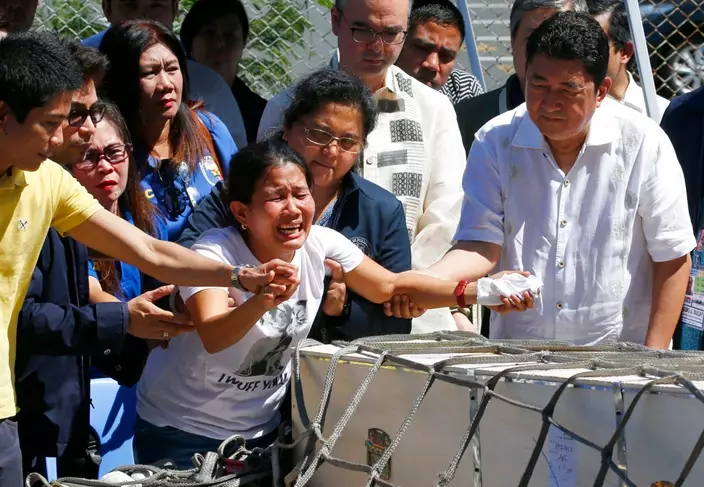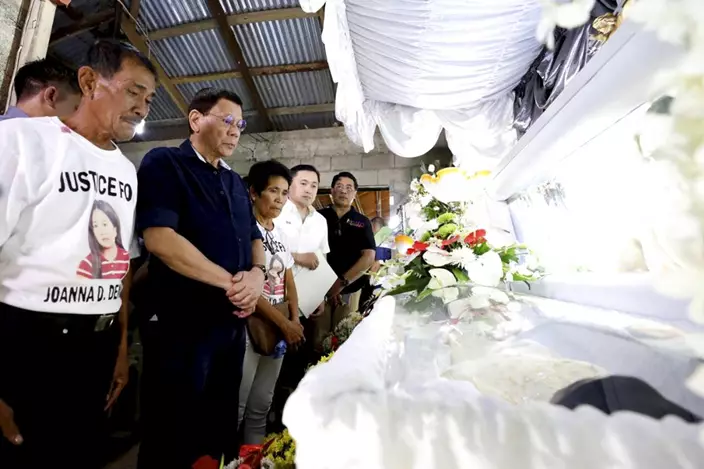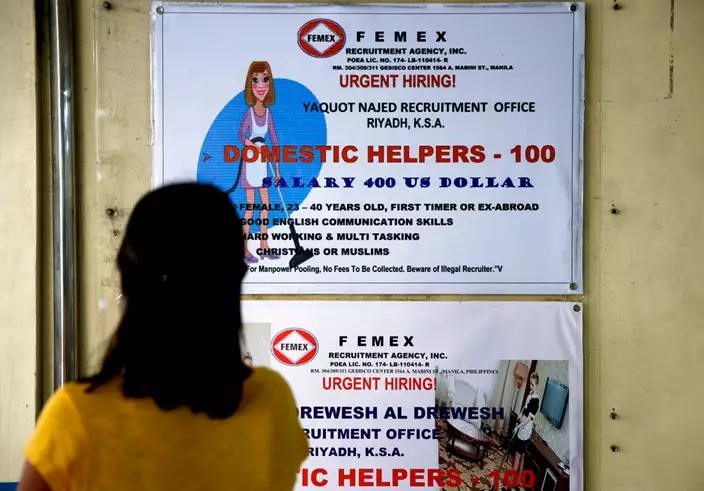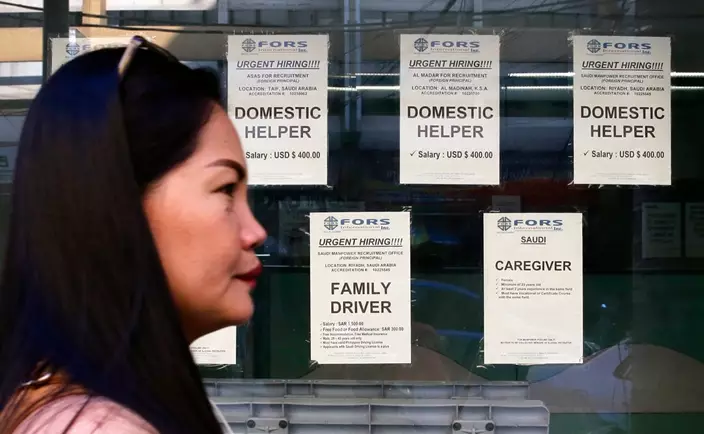When Joanna Demafelis' indebted family needed money to fix their typhoon-battered home, she followed in the footsteps of millions of other Filipinos and left to find work overseas. And like far too many Filipinos, her journey ended in tragedy.

FILE - In this photo taken Friday, Feb. 16, 2018, relatives of Joanna Demafelis, whose corpse was found in a freezer in Kuwait, react as her casket arrives at the Ninoy Aquino International Airport in Manila, Philippines. (AP Photo/Bullit Marquez, File)
Demafelis' mutilated body was found last month inside a freezer in an abandoned apartment in Kuwait, where she worked as a housemaid for a Lebanese man and his Syrian wife. She had likely been dead for more than a year.
Demafelis' flower-draped coffin sat Friday in her family home in rural Sara town in central Iloilo province, where relatives, who had alerted authorities in 2016 that she was missing, honored her memory and called for justice.

In this Feb. 22, 2018, file photo provided by the Office of the Special Assistant to the President, Philippine President Rodrigo Duterte, second from left, attends the wake for the overseas worker killed in Kuwait, Joanna Demafelis in Iloilo city, central Philippines. (AP Photo/Christopher "Bong" Go, Special Assistant to the President)
"We'll miss her. She was so kind to all of us," her brother Joejet Demafelis said, adding hundreds of relatives and friends came on the eve of her burial.
Her slaying is the latest tragedy to befall an overseas worker from the Philippines, where about a tenth of the nation's 100 million people toil in more than 200 countries worldwide to provide for families back home. Last year, those workers sent home more than $31 billion, accounting for 10 percent of the country's gross domestic product.
Officials warn Demafelis' death won't be the last. They say a dangerous mix of poverty, spotty enforcement of labor laws, difficult conditions especially in Arab nations, and the logistical nightmare of watching over huge numbers of workers abroad means other tragedies are inevitable.

A woman looks at help wanted signs outside a recruitment agency for jobs abroad in Manila, Philippines, Friday, March 2, 2018. (AP Photo/Aaron Favila)
"You gnash your teeth and ask 'Why is this happening?'" Sen. Franklin Drilon, a former labor secretary, said in an interview, adding that laws meant to protect workers needed to be enforced. "Certainly, it can happen again."
President Rodrigo Duterte has responded to Demafelis' death by banning the deployment of Filipino workers to Kuwait, though that won't affect the more than 250,000 Filipinos still working in the oil-rich nation. The Philippine Senate, meanwhile, has opened an inquiry into what went wrong.

A woman passes help wanted signs outside a recruitment agency for jobs abroad in Manila, Philippines, Friday, March 2, 2018. (AP Photo/Aaron Favila)
The president, who is prone at making public outbursts, also lashed out at Middle East nations.
"The Filipino is no slave to anyone, anywhere and everywhere," an enraged Duterte said shortly after Demafelis' body was found. "We send to you a Filipino worker, hale and hearty ... do not give us back a battered worker or a mutilated corpse."
But deaths among the army of Filipino workers abroad aren't new. Nearly 200 Filipino workers died in Kuwait over the last two years, mostly due to health reasons, but 22 cases were suicides or fatal criminal attacks, said Hans Cacdac, head of the Overseas Workers Welfare Administration in Manila.
Cacdac said 45,000 to 50,000 "distress cases" are reported each year, many of them in Arab countries.
The sixth of nine children of a poor farmer, Demafelis did not go to college and flew to Kuwait in 2014. She had wanted to earn money to repair the family house, which was battered by Typhoon Haiyan the year before, reacquire a small piece of farmland that had been mortgaged, and help pay tuition for a sibling to finish a criminology course.
"Those were her dreams that prompted her to leave," her elder brother Joejet Demafelis told The Associated Press.
For more than a century Filipinos have been doing the same. Under American colonial rule in the early 1900s, Filipinos traveled to work on pineapple plantations in Hawaii and later in fish canneries in Alaska and elsewhere on the mainland until entry restrictions eased the exodus.
In the 1970s, a construction boom in the Middle East lured more workers out of the Philippines, which had heightened political and economic uncertainties under then President Ferdinand Marcos. The Philippines labor export policy at the time addressed unemployment at home and generated badly needed foreign exchange to bolster the economy.
As the number of workers climbed, so did incidents that strained Philippine ties with host countries, such as abuse of Filipinos at the hands of employers or Filipinos committing crimes.
A 1995 case in which a Filipina housemaid was convicted of murder and executed in Singapore despite her pleas of innocence, prompted outrage in Manila and fresh legislation meant to set a higher standard of protection for workers, their families, and Filipinos in distress. Countries of destination needed to be able to guarantee the rights of workers by having signed agreements with the Philippines.
The law also set a policy that the country would "as soon as practicable" allow only skilled workers to be deployed overseas and would try to wean the country off of dependence on the earnings of migrant workers.
The law has clearly had mixed results and officials acknowledge that Demafelis fell through the cracks in its safety nets.
Demafelis' calls to her family were brief and scant and she did not mention any problem, according to her sister Joyce Demafelis. When she stopped calling in 2016, her family started to get worried and notified authorities in December that year, Joejet Demafelis said.
He said authorities did not take adequate steps to find out what happened.
Inquiries about Demafelis were passed on to a Filipino labor officer in Kuwait but the officer was too overwhelmed with complaints, Labor Secretary Silvestre Bello III said.
"I asked why no action was taken and I was told it was humanly impossible to attend to them ... there was too much work," Bello said, adding he did not accept that excuse and recalled the Kuwait-based officer and two others.
Demafelis' employers have reportedly been arrested, though few details surrounding her slaying are known, including when and how she was killed.
Unlike professionals who work in offices, housemaids are particularly vulnerable to abuse given that they work in the privacy of homes out of sight of authorities, said Bernard Olalia, who heads the Philippine Overseas Employment Administration, which regulates the deployment of Filipinos abroad.
In some countries, such as Kuwait, employers often keep the passports and cellphones of their maids to prevent them from fleeing, but it also cuts them off from their families and other support systems, Olalia said.
An option the government is considering is to ban Filipina maids from being deployed but continue allowing professionals to seek jobs abroad, Olalia said.
Amid the outrage over Demafelis' death, Philippine labor officials have pledged to shoulder the repair of her family's house, where relatives were preparing for her funeral Saturday. The government will also send her sibling through college and finance the reacquisition of her family's farmland.
"We wish all of these would have happened," Joejet Demafelis said. "But never at the cost of her life."











